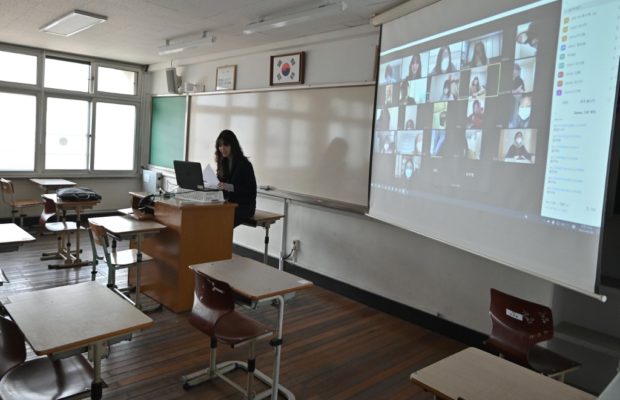
A teacher gives an online class as her students attend a virtual classroom amid concerns over the COVID-19 coronavirus at Seoul Girls’ High School in Seoul on April 9, 2020. Photo by Jung Yeon-je / AFP
SEOUL — South Korea is set to reopen schools and public facilities such as parks and libraries as the country’s strict social distancing campaign comes to an end amid declining concerns over coronavirus infections.
Tuesday (May 5) marks the last day of the nationwide campaign, which has helped to contain the spread of the virus that first emerged on Jan 20.
Only eight new cases were reported on Monday, bringing the total tally to 10,801. All the new cases were imported.
The Education Ministry said on Monday that high school seniors will be the first to return to school on May 13, while the rest will follow in phases.
The new academic year was delayed by more than five weeks before schools switched to online learning from Apr 9.
For students in the second year of high school, third year of middle school, and the first two years of elementary school, face-to-face lessons will resume on May 20.
Those in the first year of high school, second year of middle school and grades 3 and 4 in elementary school will return to school on May 27, while those in the first year of middle school and last two years of elementary school will resume lessons on June 1.
The reopening of schools should not be viewed as the end of the outbreak, Education Minister Yoo Eun-hae said at a press briefing, urging teachers, parents and students to remain vigilant.
Ms Jeong Eun-kyeong, director-general of the Korea Centers for Disease Control and Prevention, also warned that the possibility of infections in reopened schools is “not high, but is still there”.
The Education Ministry said it decided to stagger the reopening of schools based on several factors, such as the academic needs of the various ages, and to allow enough time to assess the impact of the April 30 to May 5 long weekend. Hundreds of thousands of people are expected to travel domestically over the long break, raising concerns about possible new infection clusters forming.
Ms Yoo also said younger pupils will resume lessons earlier as face-to-face learning is more effective for that age. High school seniors, meanwhile, need to prepare for the year-end college entrance exam that has been postponed by two weeks to Dec 3.
Schools also need time to disinfect all their facilities, plan lesson schedules in a way to minimize infection risks in crowded classrooms, and adjust seating arrangements.
They will also conduct regular temperature checks and require students to wear face masks except when having meals.
The ministry said schools nationwide have secured 18 million cotton masks and 14 million hygiene masks in anticipation of lessons restarting.
Should infections occur, schools will move back to online learning to prevent a wider spread.
“Schools cannot go back to the times before the Covid-19 outbreak,” Ms Yoo said, noting that students have embraced remote learning, which was once unfamiliar.
“This may become an inconvenient everyday life for all of us. However, we can wisely lead a new daily life if we all cooperate.”
South Korea is set to ease its social distancing campaign from Wednesday (May 6), allowing public facilities such as parks, libraries, museums and sports stadiums to reopen. Large gatherings and events, as well as rallies, will also be allowed if organizers take measures against infections.
The government is also urging the public to maintain what it calls “everyday life quarantine” and “routine distancing”, so as to minimize the risk of infection in the workplace, malls, and public spaces.
Measures include washing hands for 30 seconds, keeping a 2m distance from other people, taking a few days off from work if feeling unwell, and ventilating a home more than twice a day.
“Our war against the coronavirus has yet to end and it will not end in the short term,” Prime Minister Chung Sye-kyun said at a meeting with top officials on Monday.
“We have to accept that we will have to live with the coronavirus.”